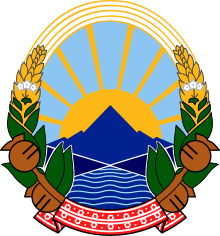Macedonian literature
| Part of a series on |
| Macedonians |
|---|
 |
| By region or country |
| Macedonia (region) |
| Diaspora |
|
|
|
|
|
Subgroups and related groups |
| Culture |
|
|
| Religion |
| Other topics |
Macedonian literature (Macedonian: македонска книжевност) begins with the Ohrid Literary School which was established in Ohrid (nowadays Republic of Macedonia) in 886. These first written works in the dialects of the Macedonian recension were religious.[1] The school was established by St. Clement of Ohrid in the First Bulgarian Empire.[2][3] The Macedonian recension at that time was part of the Old Church Slavonic and it didn't represent one regional dialect but a generalized form of early eastern South Slavic.[4] The standardization of the Macedonian language in the 20 c. provided good ground for further development of the modern Macedonian literature and this period is the richest one in the history of the literature itself.
History
The Macedonian language was not officially recognized until the establishment of Macedonia as a constituent republic of communist Yugoslavia in 1946. Krste Petkov Misirkov in his Za Makedonskite raboti (1903; English: On the Macedonian Matters) and in the literary periodical Vardar (established 1905) helped to create the foundations of ethnic Macedonian language and literature. These efforts were continued after World War I by Kosta Racin, who wrote mainly poetry in Macedonian and propagated its use through the literary journals of the 1930s. Racin's poems in Beli mugri (1939; White Dawns), which include many elements of oral folk poetry, were prohibited by the government of pre-World War II Yugoslavia because of their realistic and powerful portrayal of the exploited and impoverished Macedonian people. Some writers, such as Kole Nedelkovski, worked and published abroad because of political pressure.
Periods
The Macedonian Academy of Sciences and Arts divides Macedonian literature into three large periods, which are subdivided into additional ones. The periods of the Macedonian literature are:[5][6]
- Old Macedonian literature[7] - 9th to 18th centuries
- From introduction of the Christianity till the Turkish invasion - 9th to 14th centuries
- From Turkish invasion till the beginning of the 18th century
- New Macedonian literature - 1802 to 1944
- period of national awakening
- revolutionary period
- inter-war literary period
- Modern Macedonian literature - 1944 - today
Modern literature
After World War II, under the new republic of Macedonia, the scholar Blaze Koneski and others were charged with the task of standardizing Macedonian as the official literary language. With this new freedom to write and publish in its own language, Macedonia produced many literary figures in the postwar period. Poetry was represented in the work of Aco Šopov, Slavko Janevski, Blaze Koneski, and Gane Todorovski. Janevski was also a distinguished prose writer and the author of the first Macedonian novel, Selo zad sedumte jaseni (1952; “The Village Beyond the Seven Ash Trees”). His most ambitious work was a cycle of six novels that deals with Macedonian history and includes Tvrdoglavi (1965; “The Stubborn Ones”), a novel articulating the Macedonian people's myths and legends of remembering and interpreting their history. Prewar playwrights, such as Vasil Iljoski, continued to write, and the theatre was invigorated by new dramatists, such as Kole Cašule, Tome Arsovski, and Goran Stefanovski. Cašule also wrote several novels. A main theme of his work is the defeat of idealists and idealism. His play Crnila (1960; “Black Things”) deals with the early 20th-century murder of a Macedonian national leader by other Macedonians and with the characters of both executioners and victim.
Among the best-known writers of prose is Zivko Cingo, whose collections of stories Paskvelija (1962) and Nova Paskvelija (1965; “New Paskvelija”) are about an imaginary land where clashes and interactions between old traditions and revolutionary consciousness are enacted. His novel Golemata voda (1971; “The Great Water”), set in an orphanage, shows the grandness and sadness of childhood. Other notable writers include Vlada Uroševic (Sonuvacot i prazninata (1979; “The Dreamer and the Emptiness”)) and Jovan Pavlovski (Sok od prostata (1991; “Prostate Gland Juice”)).
Authors
Some of the well-known authors that contributed in the development of the Macedonian literature are:
- Krste Misirkov[8] - writer, Slavist and philologist
- Aco Šopov - poet and writer
- Gjorgjija Pulevski[9] - writer and political activist
- Gane Todorovski - writer, poet and academic
- Kočo Racin - writer and poet
- Kole Nedelkovski - poet
- Vojdan Černodrinski[10] - writer
- Vasil Iljoski - writer
- Blaže Koneski - writer
- Kiril Pejčinoviḱ[10] - writer
- Joakim Krčovski[10] - writer
- Slavko Janevski - writer
- Živko Čingo - writer
- Miladinov brothers[10]
- Grigor Prličev[10]
See also
- Macedonian language
- History of the Macedonian language
- Bulgarian literature
Notes
- ↑ Macedonian literature - Britannica
- ↑ Medieval Macedonian literature.
- ↑ ...He introduced the language into the official sermons and prayers in Macedonia and Southern Albania, erected several monastery's and churches, delivered sermons among the people in their own language, becoming one of the first creators of Slav and Macedonian literature., Macedonian language on cybermacedonia.com
- ↑ Old Church Slavonic grammar, Horace Gray Lunt, Walter de Gruyter, 2001, ISBN 3-11-016284-9, p. 1.
- ↑ Ristovski, Blaže. Periodizacija na makedonskiot literaturno-kulturen razvoj. Skopje: Macedonian Academy of Sciences and Arts.
- ↑ Facts about the Macedonian language, Victor Friedman.
- ↑ literary works of the Macedonian recension
- ↑ Considered/self-identified as Bulgarian.
- ↑ Considered also as Bulgarian.
- ↑ 10.0 10.1 10.2 10.3 10.4 Considered/self-identified his language and himself as Bulgarian.
References
- Makedonska književnost (“Macedonian Literature”). Tome Sazdov, Vera Stojčevska-Antić, Dragi Stefanija, Georgij Stalev, Borislav Pavlovski. Školska knjiga. Zagreb, 1988. (in sl)
External links
| |||||||||||||||||||||||||||||||||||||||||||||||||||||||||||
| ||||||||||||||||
| ||||||

